Welcome to the Amira-Avizo Software Use Case Gallery
Below you will find a collection of use cases of our 3D data visualization and analysis software. These use cases include scientific publications, articles, papers, posters, presentations or even videos that show how Amira-Avizo Software is used to address various scientific and industrial research topics.
Use the Domain selector to filter by main application area, and use the Search box to enter keywords related to specific topics you are interested in.
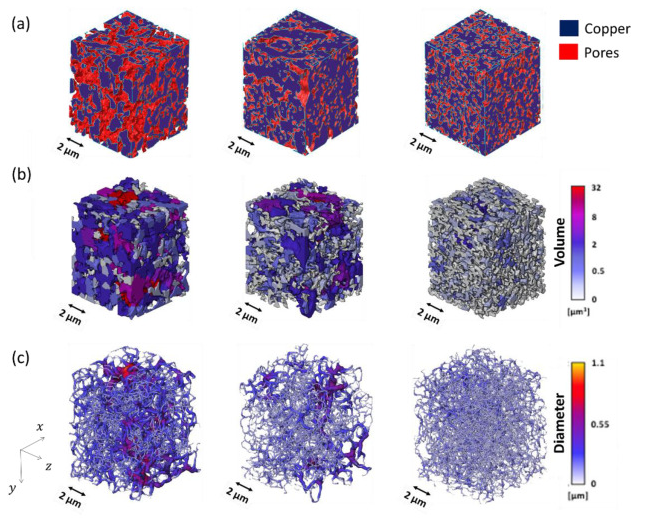
Porous materials have attracted great attention for various applications, e.g., catalysis, novel materials, energy related topics, acoustics, microelectronics, actuator, bioengineering and biomimetic. Recently, porous materials have gained interest as interconnect materials for power semiconductor device.
The trend in the semiconductor industry goes towards eco-friendliness and higher energy efficiency. Semiconductor compound materials, such as silicon carbide (SiC) or gallium nitride... Read more
A.Wijaya, B.Eichinger, F.F.Chamasemani, B.Sartory, R.Hammer, V.Maier-Kiener, D.Kiener, M.Mischitz, R.Brunner
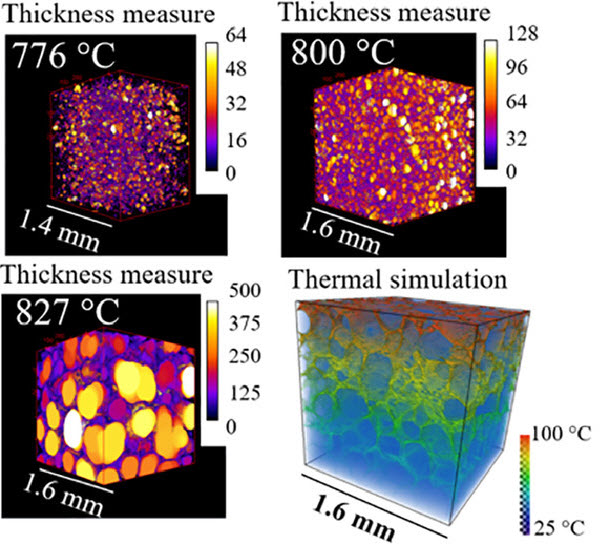
High-speed synchrotron X-ray imaging of glass foaming and thermal conductivity simulation
Glass foams are attractive thermal insulation materials, thus, the thermal conductivity (λ) is crucial for their insulating performance. Understanding the foaming process is critical for process optimization. Here, we applied high-speed synchrotron X-ray tomography to investigate the change in pore structure during the foaming process, quantifying the foam structures and porosity dynamically. The results can provide guidance for the manufacturing of glass foams. The 3D pore structures were a... Read more
Martin B. Østergaard, Manlin Zhang, Xiaomei Shen, Rasmus R. Petersen, Jakob König, Peter D. Lee, Yuanzheng Yue, Biao Cai
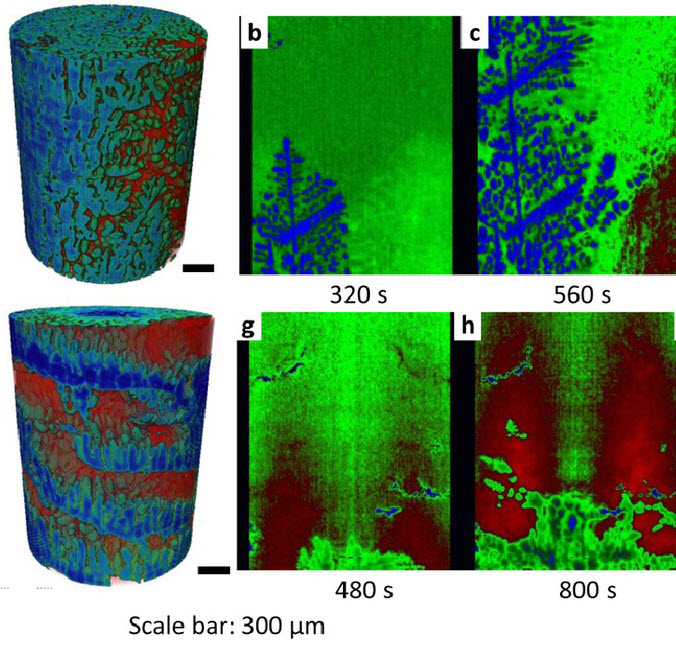
Revealing the mechanisms by which magneto-hydrodynamics disrupts solidification microstructures
A key technique for controlling solidification microstructures is magneto-hydrodynamics (MHD), resulting from imposing a magnetic field to solidifying metals and alloys. Applications range from bulk stirring to flow control and turbulence damping via the induced Lorentz force. Over the past two decades the Lorentz force caused by the interaction of thermoelectric currents and a magnetic field, a MHD phenomenon known as Thermoelectric Magnetohydrodynamics (TEMHD), was also shown to drive inter... Read more
B. Cai, A. Kao, E. Boller, O.V. Magdysyuk, R.C. Atwood, N.T. Vo, K. Pericleous, P.D. Lee
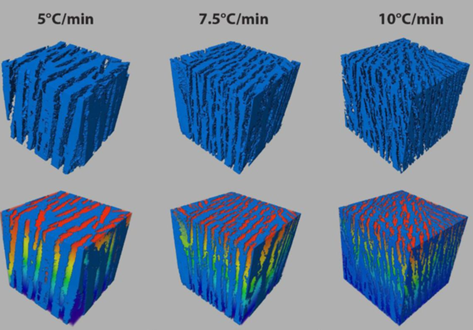
The prevailing electrode fabrication method for lithium-ion battery electrodes includes calendering at high pressures to densify the electrode and promote adhesion to the metal current collector.
However, this process increases the tortuosity of the pore network in the primary transport direction and imposes severe tradeoffs between electrode thickness and rate capability. With the aim of understanding the impact of pore tortuosity on electrode kinetics, and enabling cell designs with ... Read more
Benjamin Delattre, Ruhul Amin, Jonathan Sander, Joël De Coninck, Antoni P. Tomsia and Yet-Ming Chiang
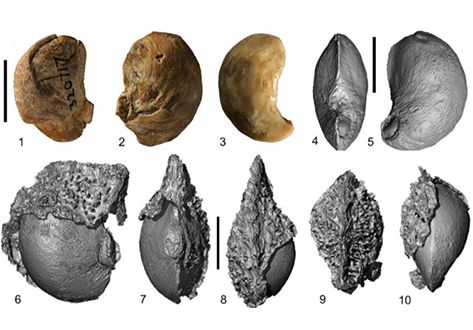
Fossil fruits formerly described as cashews from the Oligocene of Peru are reinvestigated based on the original specimens and newly collected materials. The recovery of an outer spiny layer, preserved in the sedimentary molds surrounding the locule casts, indicates that these disseminules do not represent Anacardium. Imagery from nano-CT scans of the specimens documents a distinctive morphology which does not resemble any fruits or seeds of Anacardiaceae. We describe the morphology in more de... Read more
STEVEN R. MANCHESTER, BEHNAZ BALMAKI
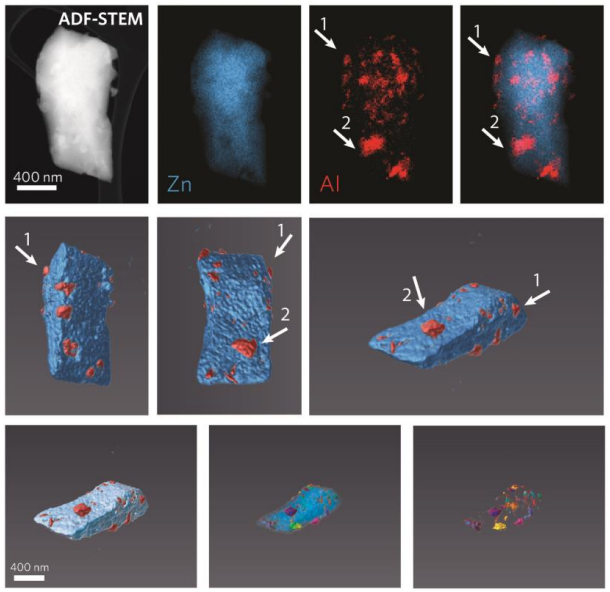
Metal-Organic Framework Crystal-Glass Composites
The majority of research into metal-organic frameworks (MOFs) focuses on their crystalline nature. However, in recent research the vitrification of a number of MOFs has been revealed. We propose that the solid-liquid phase transitions involved in MOF-glass formation can provide unique opportunities for the creation of a new class of functional, stable and porous composite materials. Described herein is the design, synthesis, and characterisation of novel metal-organic framework (MOF) crystal-... Read more
Jingwei Hou, Christopher W. Ashling, Sean M. Collins, Andraž Krajnc, Chao Zhou, Louis Longley, Duncan N. Johnstone, Philip A. Chater, Shichun Li, François-Xavier Coudert, David A. Keen, Paul A. Midgley, Gregor Mali, Vicki Chen, Thomas Bennett
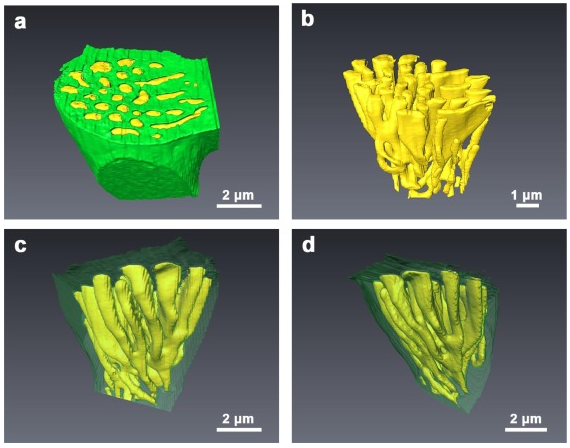
A combination of 3D tomography techniques provides direct evidence that links the phase assemblage to the bio-corrosion behaviour of a magnesium-zinc-calcium (Mg-Zn-Ca) alloy. The true shape, connectivity and volume fraction of the components have been determined using focused ion beam (FIB) tomography. The mechanism of the effect of the components with different morphologies on biodegradation was studied with the help of FIB. Micro X-ray CT (MicroCT) was used to investigate the degradation o... Read more
Y.Lu, R.G.Ding, Y.L.Chiu, I.P.Jones

Classification and delineation of the motor-related nuclei in the human thalamus have been the focus of numerous discussions for a long time. Difficulties in finding consensus have for the most part been caused by paucity of direct experimental data on connections of individual nuclear entities. Kultas-Ilinsky et al. (2011, J Comp Neurol, 519:2811-2837) showed that distribution of the isoform 65 of glutamic acid decarboxylase (GAD65), the enzyme that synthesizes inhibitory neurotransmitt... Read more
Igor Ilinsky, Andreas Horn, Perrine Paul-Gilloteaux, Pierre Gressens, Catherine Verney, Kristy Kultas-Ilinsky
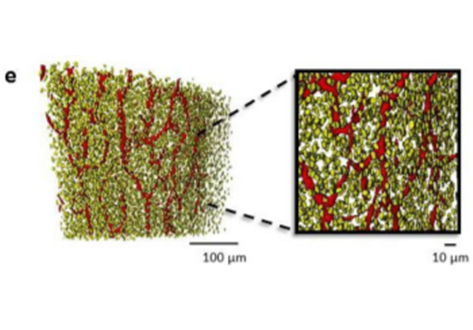
Cortical bone is permeated by a system of pores, occupied by the blood supply and osteocytes. With ageing, bone mass reduction and disruption of the microstructure are associated with reduced vascular supply. Insight into the regulation of the blood supply to the bone could enhance the understanding of bone strength determinants and fracture healing. Using synchrotron radiation-based computed tomography, the distribution of vascular canals and osteocyte lacunae was assessed in murine cortica... Read more
J.A. Núñez; A. Goring; B. Javaheri; H. Razi; D. Gomez-Nicola; E. Hesse; A.A. Pitsillides; P.J. Thurner; P. Schneider; E. Clarkin
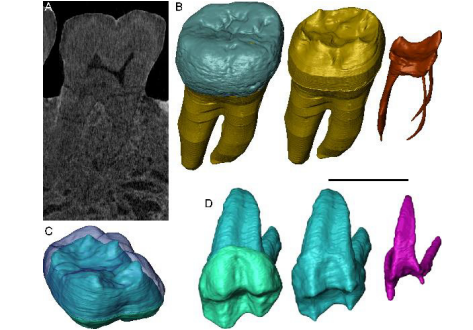
Exploring hominin and non-hominin primate dental fossil remains with neutron microtomography
Fossil dental remains are an archive of unique information for paleobiological studies. Computed microtomography based on Xray microfocus sources (X-µCT) and Synchrotron Radiation (SR-µCT) allow subtle quantification at the micron and sub-micron scale of the meso- and microstructural signature imprinted in the mineralized tissues, such as enamel and dentine, through highresolution “virtual histology”. Nonetheless, depending on the degree of alterations undergone during fossiliza... Read more
Clément Zanolli, Laboratory AMIS, UMR 5288, University of Toulouse III - Paul Sabatier, France, and al.
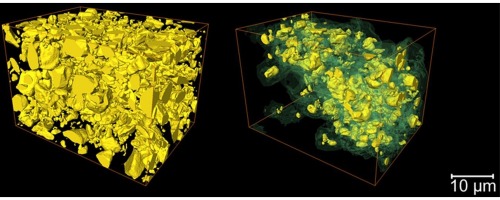
The microstructural degradation of a composite silicon electrode at different stages in its cycle life was investigated in 3D using X-ray nano-computed tomography. A reconstructed volume of 36 μm × 27 μm × 26 μm from the composite electrode was imaged in its pristine state and after 1, 10 and 100 cycles. Particle fracturing and phase transformation was observed within the electrode with increased cycling. In addition, a distinct, lower X-ray attenuating phase was clearly resolved,... Read more
Oluwadamilola O. Taiwo, Melanie Loveridge, Shane D.Beattie, Donal P.Finegan, Rohit Bhagat, Daniel J.L.Brett, Paul R.Shearing
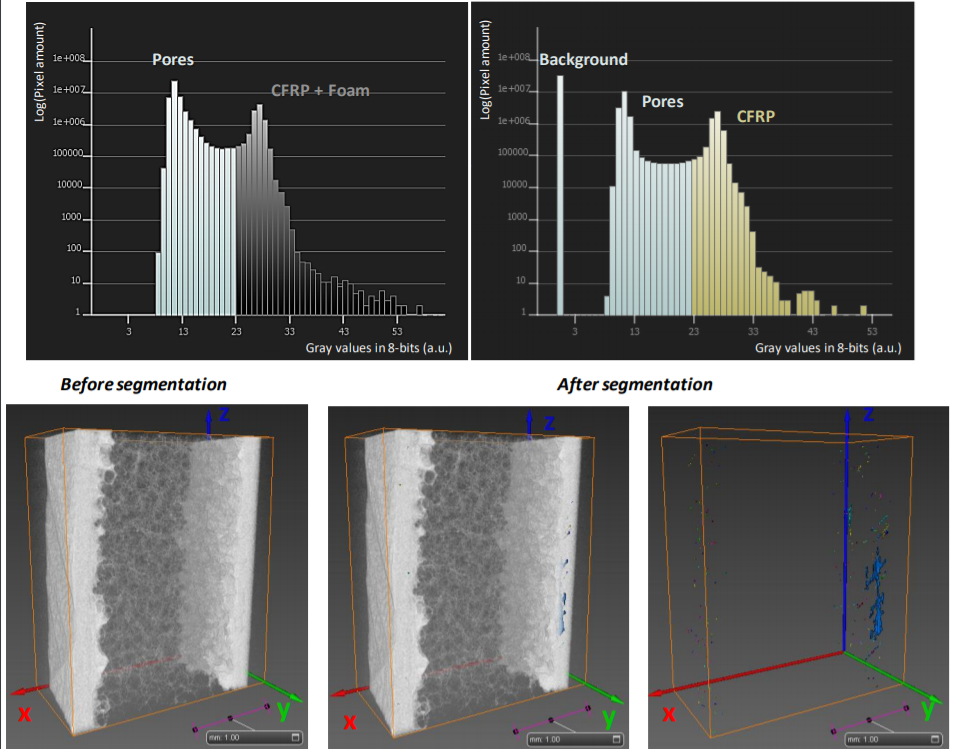
The aim of the current study is to propose a versatile, non-destructive inspection strategy to evaluate the structure of two different aircraft carbon fibre reinforced polymer (CFRP) -based composite configurations, which are widely used for structural elements, respectively layered composite and sandwich structure. X-ray computed tomography (CT) has been used as a flexible method for assessment of porosity levels in CFRP components in both types of configuration, permitting to investigate th... Read more
Elena Dilonardo, Michele Nacucchi, Fabio De Pascalis, Mauro Zarrelli, Cinzia Giannini
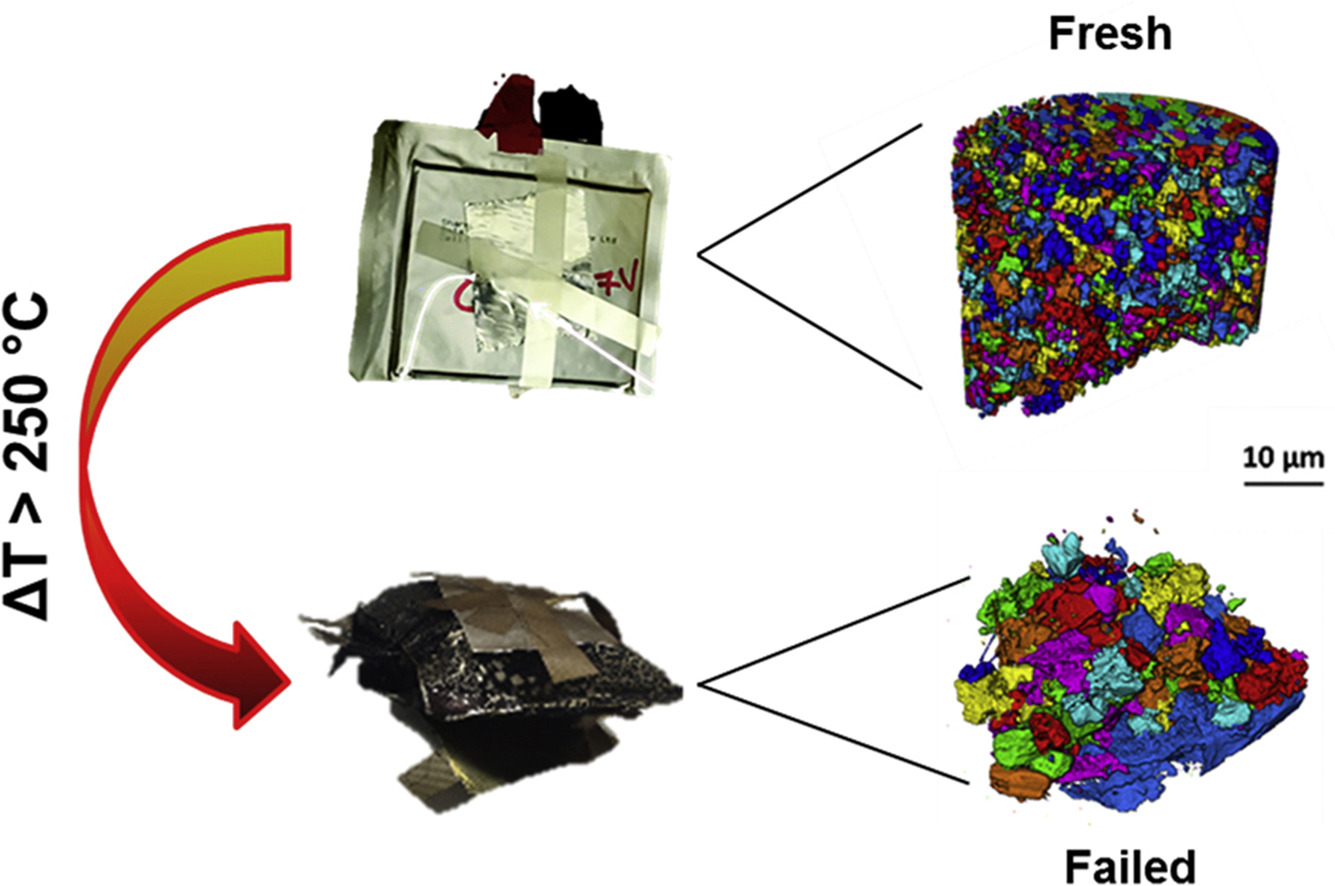
Multiscale tomographic analysis of the thermal failure of Na-Ion batteries
In recent years, the ability to examine the processes that cause the catastrophic failure of batteries as a result of thermal runaway has improved substantially. In this work, the effect of thermal runaway on the microstructure of the electrodes of a Na-ion battery is examined using X-ray computed tomography for the first time. The thermal failure induced via accelerating rate calorimetry enabled the examination of failed electrodes, which were subsequently compared with fresh s... Read more
Robinson, J. B., Heenan, T. M. M., Jervis, J. R., Tan, C., Kendrick, E., Brett, D. J. L., & Shearing, P. R.
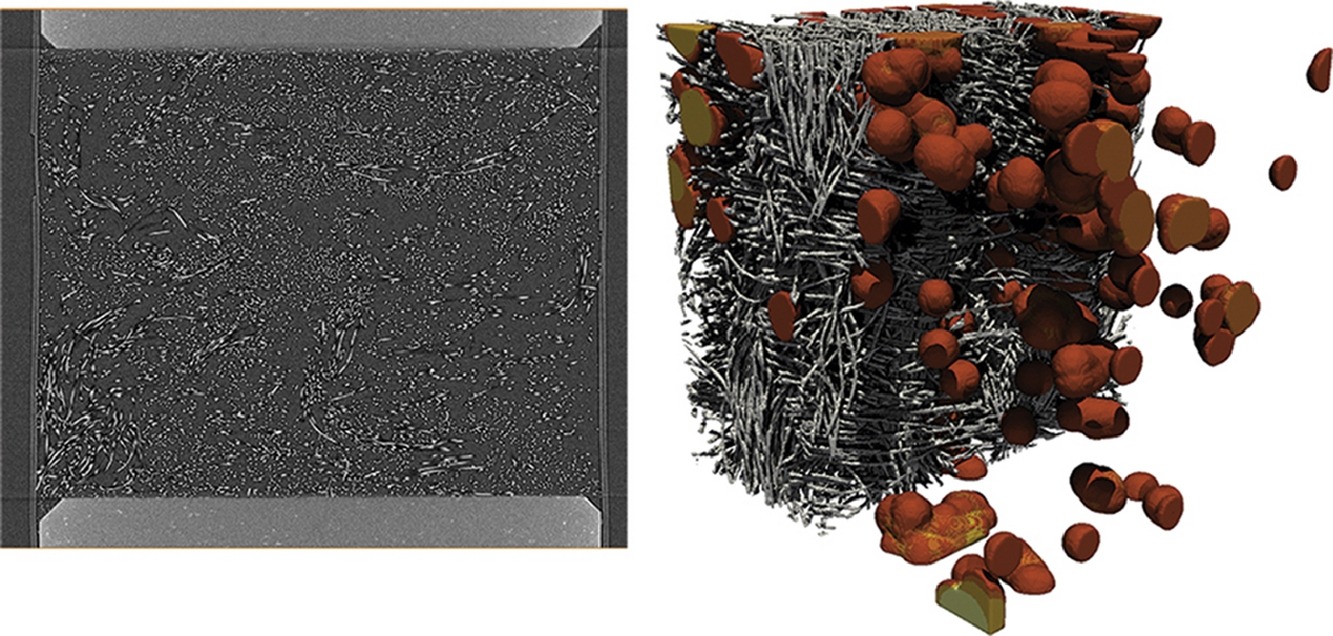
In situ compression and X-ray computed tomography of flow battery electrodes
Redox flow batteries offer a potential solution to an increase in renewable energy generation on the grid by offering long-term, large-scale storage and regulation of power. However, they are currently underutilised due to cost and performance issues, many of which are linked to the microstructure of the porous carbon electrodes used. Here, for the first time, we offer a detailed study of the in situ effects of compression on a commercially available carbon felt electrode. Visualisation ... Read more
Rhodri Jervis , Matt D.R. Kok , Tobias P. Neville , Quentin Meyer , Leon D. Brown , Francesco Iacoviello , Jeff T. Gostick , Dan J.L. Brett , Paul R. Shearing
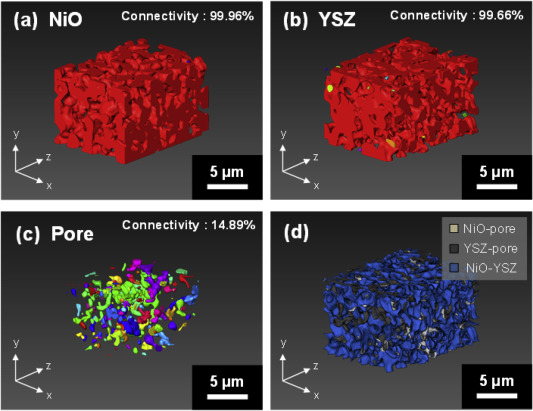
Nickel-yttria-stabilized zirconia (Ni-YSZ) cermet is widely used as an anode material in solid oxide fuel cells (SOFCs); however, Ni re-oxidation causes critical problems due to volume expansion, which causes high thermal stress. We fabricated a Ni-YSZ anode functional layer (AFL), which is an essential component in high-performance SOFCs, and re-oxidized it to investigate the related three-dimensional (3D) microstructural and thermo-mechanical effects. A 3D model of the re-oxidized AFL ... Read more
Jun Woo Kim, Kiho Bae, Hyun Joong Kim, Ji-won Son, Namkeun Kim, Stefan Stenfelt, Fritz B. Prinz, Joon Hyung Shim
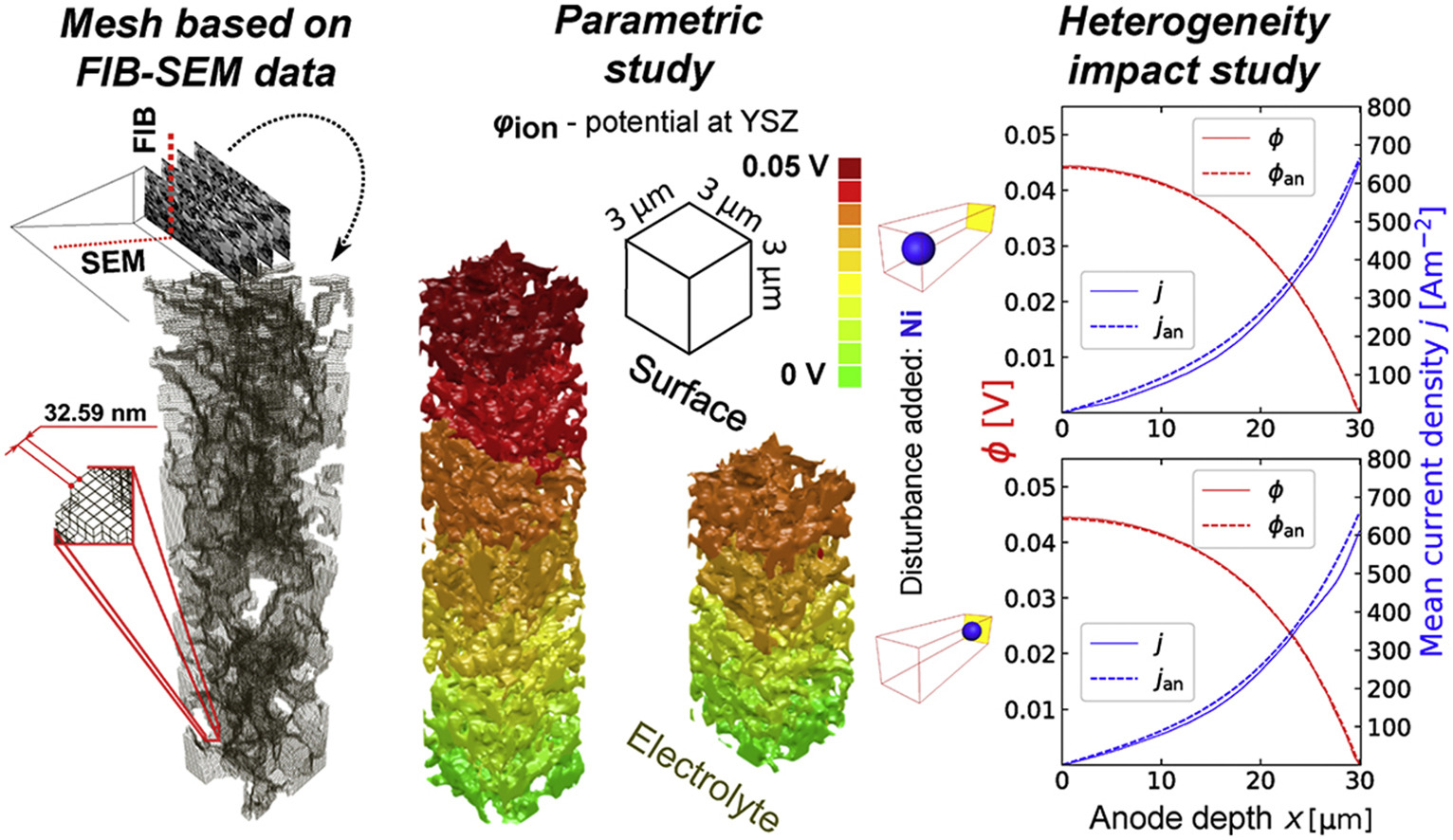
In this paper a fully three dimensional, multiphase, micro-scale solid oxide fuel cellanode transport phenomena numerical model is proposed and verified. The Butler-Volmer model was combined with empirical relations for conductivity and diffusivity – notably the Fuller-Shetler-Giddings equation, and the Fickian modelfor transport of gas reagents. FIB-SEM tomography of a commercial SOFC stack anode was performed and the resulting images were processed to acquire input data. ... Read more
Tomasz A. Prokop, Katarzyna Berent, Hiroshi Iwai, Janusz S.Szmyd, Grzegorz Brus
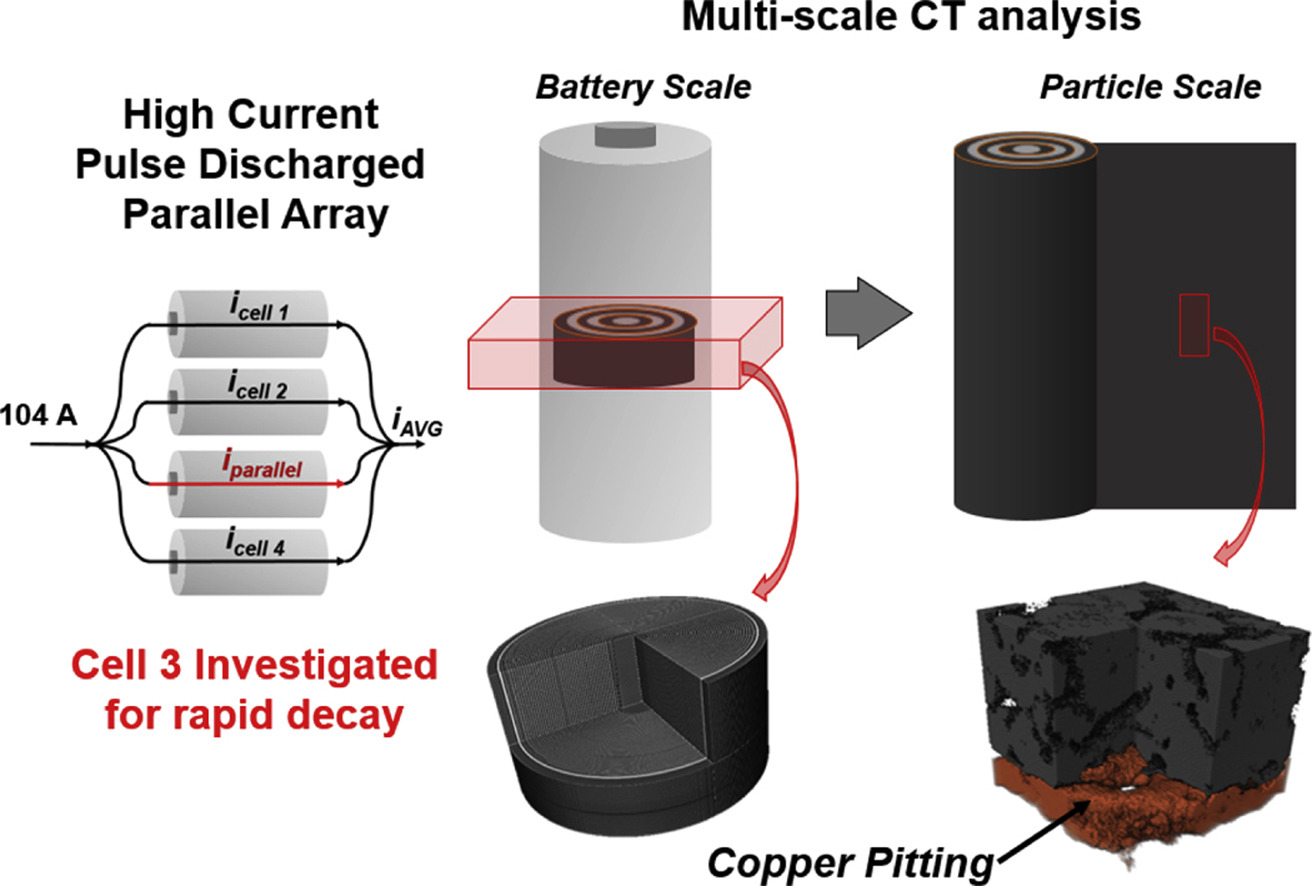
X-ray computed tomography (X-ray CT) across multiple length scales is utilized for the first time to investigate the physical abuse of high C-rate pulsed discharge on cells wired individually and in parallel.. Manufactured lithium iron phosphate cells boasting high rate capability were pulse power tested in both wiring conditions with high discharge currents of 10C for a high number of cycles (up to 1200) until end of life (<80% of initial discharge capacity retained). The parallel ass... Read more
Rachel Carter, Brett Huhman, Corey T. Love, Iryna V. Zenyuk
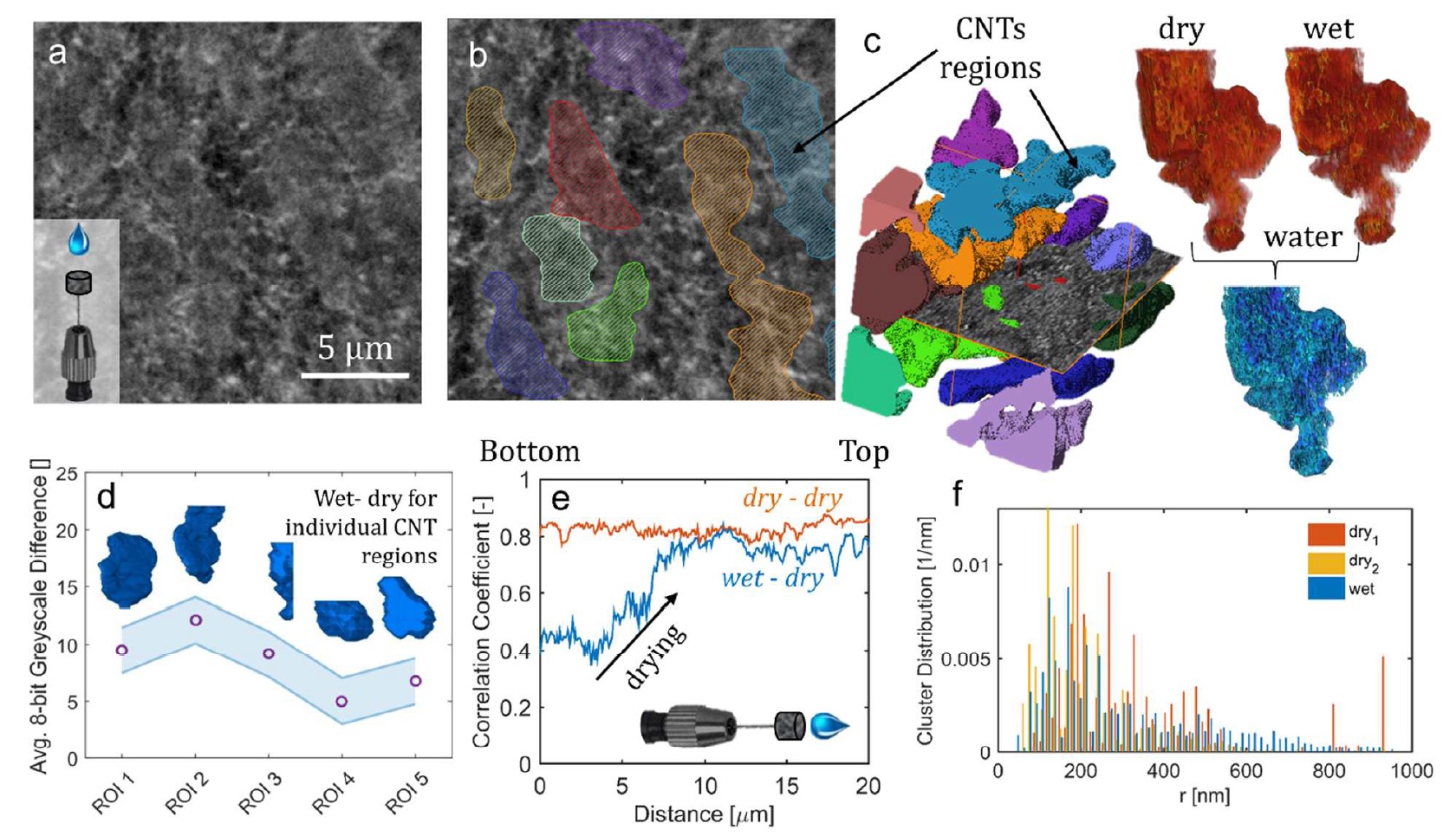
This work describes the performance improvement of a polymer electrolyte fuel cell with a novel class of microporous layers (MPLs) that incorporates hydrophilic additives: one with 30 μm aluminosilicate fibers and another with multiwalled carbon nanotubes with a domain size of 5 μm. Higher current densities at low potentials were observed for cells with the additive-containing MPLs compared to a baseline cell with a conventional MPL, which correlate with improvements in water management. Th... Read more
Dusan Spernjak, Rangachary Mukundan, Rodney L. Borup, Liam Connolly, Benjamin Zackin, Vincent De Andrade, Michael Wojcik, Dilworth Y. Parkinson, David Jacobson, Daniel Seth Hussey, Karren L More, Thomas Chan, Adam Z Weber, and Iryna V. Zenyuk
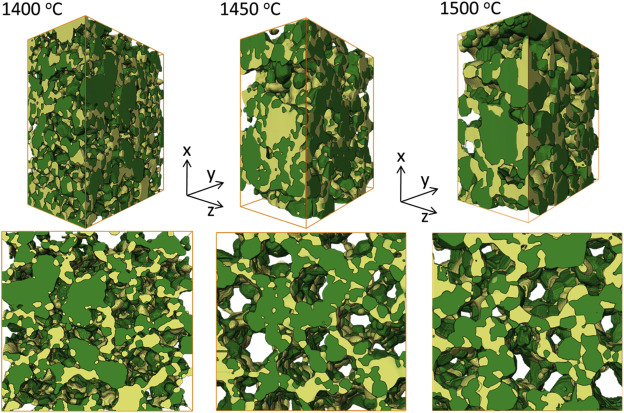
High performance anode with dendritic porous structure for low temperature solid oxide fuel cells
A dendritic porous supported microstructure simultaneously creates small pore size and broad gas diffusion pathways in a solid oxide fuel cell anode membrane. This microstructure also achieves pore sizes that reduce with increasing depth within the membrane without increasing the structure tortuosity. Such a microstructure supplies high triple phase boundary density, fast gas diffusion and low polarization resistance. Here we characterise the performance of a porous anode with such a dendriti... Read more
Xin Shao, William D.A. Rickard, Dehua Dong, Huu Dang , Martin Saunders, Aaron Dodd, Gordon Parkinson, Chun-Zhu Li
Cryo-STEM mapping of solid–liquid interfaces and dendrites in lithium-metal batteries
Solid–liquid interfaces are important in a range of chemical, physical and biological processes but are often not fully understood owing to the lack of high-resolution characterization methods that are compatible with both solid and liquid components. For example, the related processes of dendritic deposition of lithium metal and the formation of solid–electrolyte interphase layers are known to be key determinants of battery safety and performance in high-energy-density lithium-metal bat... Read more
Michael J. Zachman, Zhengyuan Tu, Snehashis Choudhury, Lynden A. Archer & Lena F. Kourkoutis

Growing popularity and rapid development of Solid Oxide Fuel Cells (SOFCs) stem for their potential to become a gamechanger in the field of clean power generation technologies.
In this paper, a transient microstructure-oriented numerical simulation of a planar Direct Internal Reforming Solid Oxide Fuel Cell (DIR-SOFC) is delivered. The performance criteria in a direct steam reforming for a fuel starvation scenario are analyzed in order to optimize the underlying process. The proposed t... Read more
Maciej Chalusiak, Michal Wrobel, Marcin Mozdzierz, Katarzyna Berent, Janusz S. Szmyd, Shinji Kimijima, Grzegorz Brus